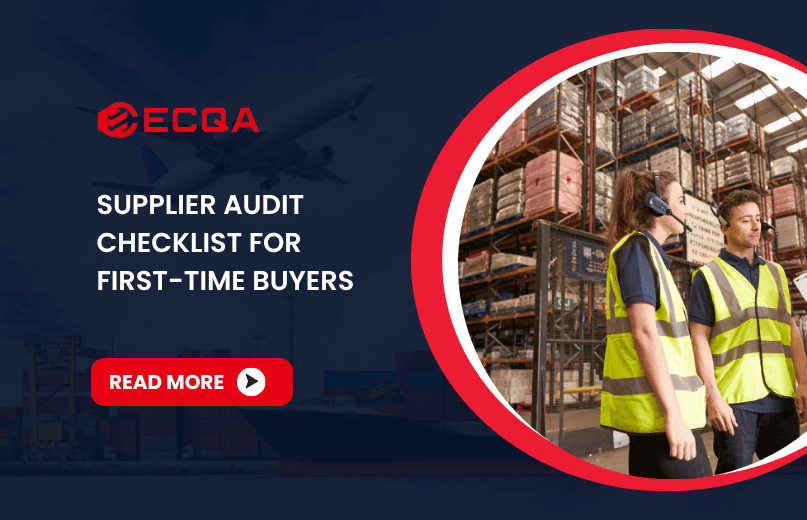
Supplier Audit Checklist for First-Time Buyers
Establishing a reliable supply chain begins with rigorous supplier evaluation. A supplier audit serves as a structured approach to verify whether a supplier meets required standards, mitigates risks, and aligns with business expectations. For first-time business buyers, navigating this process demands a comprehensive, step-by-step framework that leaves no room for costly oversight.
What is Supplier Audits?

A supplier audit is an on-site evaluation of a supplier’s facilities, operations, systems, and management practices to ensure they comply with contractual obligations, regulatory requirements, and quality standards. This proactive measure allows buyers to uncover hidden risks before entering into agreements.
Why First-Time Buyers Cannot Skip Supplier Audits
Entering a supplier relationship without a full audit is akin to navigating unfamiliar terrain blindfolded. First-time buyers face amplified risks due to lack of experience, limited supplier history, and often, overreliance on verbal assurances. A properly executed audit offers several crucial advantages:
- Verifies operational capabilities
- Confirms legal and regulatory compliance
- Evaluates quality control systems
- Assesses financial stability
- Detects potential ethical or sustainability issues
- Mitigates intellectual property risks
- Validates production capacity against demand forecasts
Core Elements of a Supplier Audit Checklist
A thorough supplier audit checklist must be multi-dimensional, covering every operational and strategic aspect that could impact your business. Below is a detailed breakdown of the critical components to include.
1. Company Legitimacy and Credentials
Before diving into operations, confirm the supplier’s legal existence and authority to operate:
- Business license verification
- Tax registration certificates
- Export and import licenses (if applicable)
- Certifications (ISO 9001, ISO 14001, SA8000, etc.)
- Ownership structure and key management personnel
2. Financial Health and Stability
Financial solvency directly influences a supplier’s ability to sustain operations. Investigate:
- Audited financial statements for the last three years
- Credit reports and banking references
- Outstanding debts or liens
- Profitability trends and cash flow stability
3. Facility Infrastructure and Capacity
An on-site evaluation reveals the true scale and reliability of a supplier’s infrastructure:
- Facility size and layout
- Equipment inventory and maintenance records
- Production lines and daily throughput capacity
- Storage conditions for raw materials and finished goods
- Safety and emergency preparedness systems
4. Quality Management System (QMS)
Quality assurance practices determine whether consistent product standards are achievable:
- Documented QMS policies and procedures
- Incoming material inspection protocols
- In-process quality controls and checkpoints
- Finished product inspection routines
- Non-conformance handling procedures
- Corrective and preventive action (CAPA) systems
5. Raw Material Sourcing and Traceability
Traceability minimizes the risk of counterfeit, non-compliant, or ethically compromised materials:
- Approved supplier lists
- Supplier qualification procedures
- Material certificates of analysis
- Batch tracking systems
- Conflict minerals disclosure (if relevant)
6. Regulatory Compliance and Certifications
International trade demands strict adherence to applicable regulations:
- Compliance with product safety standards (CE, FDA, RoHS, REACH, etc.)
- Environmental permits and policies
- Occupational health and safety certifications
- Labor law compliance documentation
- Anti-bribery and corruption policies
7. Workforce Qualifications and Labor Conditions
The skill level and treatment of factory workers impact both product quality and corporate social responsibility:
- Workforce size and skill breakdown
- Training and competency certification programs
- Working hours and wage compliance
- Labor contract documentation
- Policies on child labor, forced labor, and discrimination
- Employee grievance mechanisms
8. Information Security and Intellectual Property Protection
Protecting sensitive designs, proprietary processes, and trade secrets is non-negotiable:
- Non-disclosure agreements (NDAs)
- Access controls for design files and specifications
- Secure data management protocols
- Cybersecurity infrastructure
9. Supply Chain Management and Logistics
Evaluate the supplier’s ability to deliver consistent, on-time shipments:
- Lead time reliability
- Inventory management systems
- Supplier contingency planning
- Preferred freight forwarders and customs brokers
- Export documentation procedures
10. Ethical Practices and Sustainability Initiatives
Modern buyers must ensure suppliers align with environmental, social, and governance (ESG) principles:
- Corporate social responsibility policies
- Carbon footprint reduction programs
- Hazardous waste management
- Renewable energy utilization
- Community engagement programs
11. Insurance and Risk Mitigation
Insurance coverage reflects a supplier’s preparedness for operational disruptions:
- Product liability insurance
- Property and casualty insurance
- Business continuity and disaster recovery plans
For a detailed guide on conducting supplier audits specifically in China, refer to our article on Conduct Supplier Audit in China
The Strategic Value of Professional Third-Party Supplier Auditors
While first-time buyers may be tempted to conduct audits themselves, engaging seasoned third-party auditing firms often delivers superior outcomes. Their advantages include:
- Impartial, objective assessments
- Broad industry benchmarking experience
- Deep regulatory expertise
- Local language fluency and cultural understanding
- Comprehensive audit reporting standards
Choosing a credible auditing partner dramatically enhances audit credibility and provides deeper insights, particularly for complex international supply chains.
A well-executed supplier audit empowers first-time business buyers to make informed, confident sourcing decisions. It transforms supplier relationships from speculative gambles into structured, data-driven partnerships anchored in transparency, compliance, and long-term viability. Prioritizing comprehensive audits is not simply a defensive strategy. It is a cornerstone of sustainable business growth. Contact ECQA today to schedule your comprehensive supplier audit.

 Request Free Sample Report
Request Free Sample Report